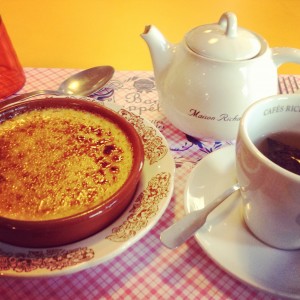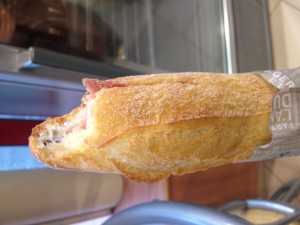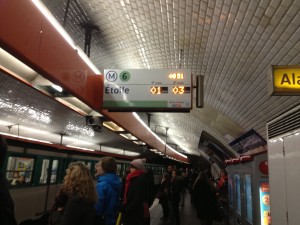When the CMWR facilitated the workshop, “Out and About: A Short Guide to City Living” on February 24, I was devastated that I could not be there, reppin’ my city and doling out sassy advice.
Because of my absentee status, I decided to write an abridged version of the workshop, Parisian style. All this information, however, comes from the perspective of a newcomer who has attended the “life experience” workshop in Paris (and therefore cannot compare her advice to the Chicago aficionados at the CMWR).
Disclaimer: if this seems cutting or sardonic, it’s because all of these experiences evoked the utmost humility, to the point where I could do nothing but laugh and “pardon” myself.
Though Paris has many iconic attributes, I’ve dedicated the majority of this piece to the most crucial of them all: food. There are notes on transportation as well at the end.
Wining and Dining:
This expression, “wine and dine,” does not translate well into French, as I learned in Translation class. Perhaps it’s because the act of “dining” in French implies wine (if you have the means, which I usually don’t).
Nevertheless, there’s a set of unwritten rules in meal consumption here. If you do not follow these rules, you put yourself at risk for public shaming in the form of hushed insults from the wait staff – or worse, an actual verbal reprimand (ten times as shameful). Here’s a list of tentative rules and tips:
1) Finish the food on your plate. Leaving a morsel of salad – which means one green leaf, as “salad” here consists of lettuce, other green leaves and vinaigrette dressing – conveys the equivalent of chopping one tree down and burning it. Think of the chef as the benevolent planter of that tree you just incinerated. That’s how much you must hate his food and his establishment (in this case, the Earth).
In all seriousness, the French cherish meals and are extremely conservative when it comes to waste. Heat, electricity, and water, for example, are considered privileges, not rights. Paris’s reputation as the gastronomic capital of the world has some truth to it as well; they hold the prepared dish in high esteem. Savoring every bite of a meal essentially “shows and doesn’t tell” the chef that you enjoyed his food, even if a few stray pieces of chicken fat may seem excessive. Plus, this should help eliminate the need to snack (One of the reasons why, evidently, French people aren’t fat!)
2) Waiters in France are like cats: you must attract their attention, and even in that case, they might not come. I dabble in a few, if not all of these techniques: Position your body in an eye-catching way. Stare them down so they can feel your eyes burning into their skulls. Raise a limp hand like a student waiting for the teacher to look up from her lecture notes.
3) Consistent with the anti-waste movement, waiters neither automatically serve water nor ask if you would like any. When you realize it’s your duty to ask, you order a container for the table: “un carafe d’eau.” Asking for “some water” in French immediately signals that you’re American – if, by some miracle, they had not already sniffed that out. I swear, we must carry around some potent American pheromones by how easily they detect our nationality.
4) Asking for the check incites another round of eye-games, weird hand symbols, and awkward phrases. You can either lift your hand and say “l’addition, s’il vous plait,” sign an invisible check on the table, or merely gaze in the waiter’s direction longingly until he arrives.
5) Rumors, friends, sometimes blossom into beautiful truths. Yes, tipping is unnecessary at dining establishments, in bars, in taxis, etc. Do not feel guilty; the service industry makes up for the subtracted tip by actually paying its workers reasonable wages. However, if the service was excellent and merited a reward of some sort, no one will turn away a bit of extra change. Also, be wary of those American vibes you may emanate – some restaurants are cognizant of the customs in America and may try to persuade you into exercising them here.
General notes on food:
1) “Un café” signifies both coffee and a relaxed dining establishment. In terms of coffee, the French serve mostly espresso or small quantities of regular coffee. The initial alarm that you’ll feel after they hand you your beverage in a Dixie-cup will fade away once the espresso kicks in.
2) You’ll find your best bet for a relatively priced meal at a café. They usually offer “formules,” similar to meal deals, that include any combination of a salad, entrée, hot beverage and dessert. Bars and brasseries are similar in price range and cuisine.
Note: an “entrée” in French means appetizer. An entrée in English is “plat” in French. What came first, the French entrée or the American?

3) Bakery translates into any of these words: “boulangerie/boulange/boulanger/patisserie/pattisier.” Here you’ll find the most satisfying of portable, relatively cheap foods, ranging from elaborate pastries to sandwiches and pizza. The most standard of sandwiches, in which I indulge several times a week, is comprised of ham, cheese, and butter slathered on a full baguette. It’s inexpensive and provides sustenance for hours. It’s a mélange of my favorite things: cheese, bread, and cost-effective meal choices. And since ham ranks number one on the list of things French people love, it’s only logical that it should make my list, too (Seriously, ham is everywhere).
Quirky Transportation Findings:
1) Living in Paris has only enabled my impatience for public transit. Trains run so frequently here that if I have to wait for more than four minutes, I’m appalled.
2) The metro, the general name for the RTP public transit system here, does not run all night (Chicago 1, Paris 0). Even on weekends. It’s absurd. Weekdays, the last train leaves at 12:30 a.m. from the tail end of each station. On Fridays and Saturdays, they generously extend this to 1:30 a.m. Therefore, if you want to stay out past 1:30, prepare yourself for “une nuit blanche” (an all-nighter) and hop on the next train at 5:30 a.m.
3) There’s always the option of dishing out some dough for a cab or taking the ever-sketchy “Noctilian,” a night bus that carts drunkies and creepers alike throughout Paris to who-knows where. However, those are less than favorable alternatives for a cheap female student living in a city with a cursed conversion rate.
4) The Navigo Pass, equivalent to a Ventra Card, offers weekly and monthly passes. These deals start on the actual Sunday of the week or the first of the month and don’t allow the liberty of starting a full month whenever you please (Chicago 2, Paris 0).
Discover more from UCWbLing
Subscribe to get the latest posts sent to your email.


